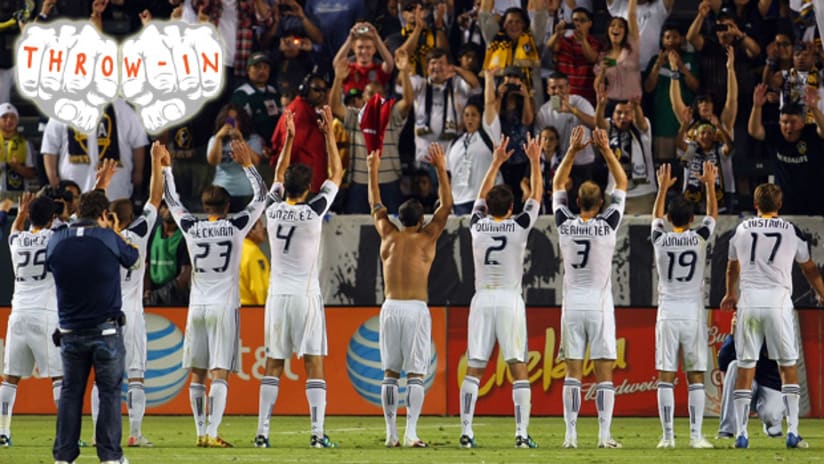LOS ANGELES – Galaxians, LA Riot Squad and Angel City Brigade, let’s get this party started: You may be blessed with the last-ever neutral-site MLS Cup final.
And if your beloved Galaxy continue their run of regular-season dominance next year, your team could be hosting another MLS Cup at the Home Depot Center in 12 months.
We’ll find out in the next few days if the MLS Board of Governors approves a proposal to scrap the neutral-site final system – in existence since the founding of the league – in favor of allowing the top seed in the big game to host it.
This idea has gained so much momentum in recent years that, frankly, I’d consider it an upset if it doesn’t happen. There’s been far too much back-and-forth over the Supporters’ Shield vs. MLS Cup debate and finding other ways to reward regular-season excellence.
But far more importantly, there’s an easy truth at play here: Hometown MLS Cup finals do gangbusters. The Galaxy are living up to expectations in bringing the fans out en masse for Sunday, only the third time in league history that a team will play the big game in their home venue.
The Galaxy join D.C. United in 1997 and New England in 2002 as “home” teams. Those two games mark the best-attended MLS Cup finals ever (D.C.’s win over Colorado at RFK Stadium drew 57,431, while the Galaxy’s upset of New England at Gillette Stadium packed in a massive 61,316).
Not surprisingly, the Home Depot Center is easily sold out for Sunday’s game between LA and Houston; but even with standing-room only seats and the grass berm above the north stands open, the HDC will only hold somewhere north of its regular 27,000 capacity (the Galaxy declined to give an estimate). So the final number itself won’t rank among the top-attended MLS Cups.
But no MLS Cup has ever sold out faster. Every seat in the Home Depot Center was sold not long after the Galaxy clinched a spot in the game by beating Real Salt Lake in the Western Conference Championship on Nov. 6, which would have been a full sellout two weeks prior to the match – the earliest ever.
Even the announced sellout after the Galaxy made extra seats available set a record, with every existing ticket in the building accounted for 10 days in advance of the game.
Another sign of the magnitude of this game is that more than 500 applications were received for media credentials, according to a league spokesman – another all-time mark – and more international journalists applied to cover the game than ever before.
(As an aside, MLS is also expecting TV viewership that could top MLS Cup 2009 as the most-watched final in league history. According to Google Analytics, there have never been more web searches for “MLS Cup,” either. Signs are everywhere that this could be one of the biggest MLS Cups in history.)
Sure, there are other story lines at play here. The possibility that Sunday’s final could be the last appearance of a certain Englishman in a Galaxy jersey is certainly a significant a draw. And to be fair, the star-studded LA roster would draw at any other venue, too (LA vs. RSL at MLS Cup 2009 in Seattle stands as the fourth-best attended of all time).
But the truth is this: This match could’ve filled up most, if not all, of the seats at the Rose Bowl or Los Angeles Memorial Coliseum.
That kind of excitement around the biggest game on the MLS schedule can do wonders. It is the biggest piece of evidence to fans — and potential fans — that MLS Cup is a must-see event.
Playing it in front of a rabid hometown crowd is one major tweak in the playoff system that fans can and should support 100 percent.
Jonah Freedman is the managing editor of MLSsoccer.com. "The Throw-In" appears weekly.














